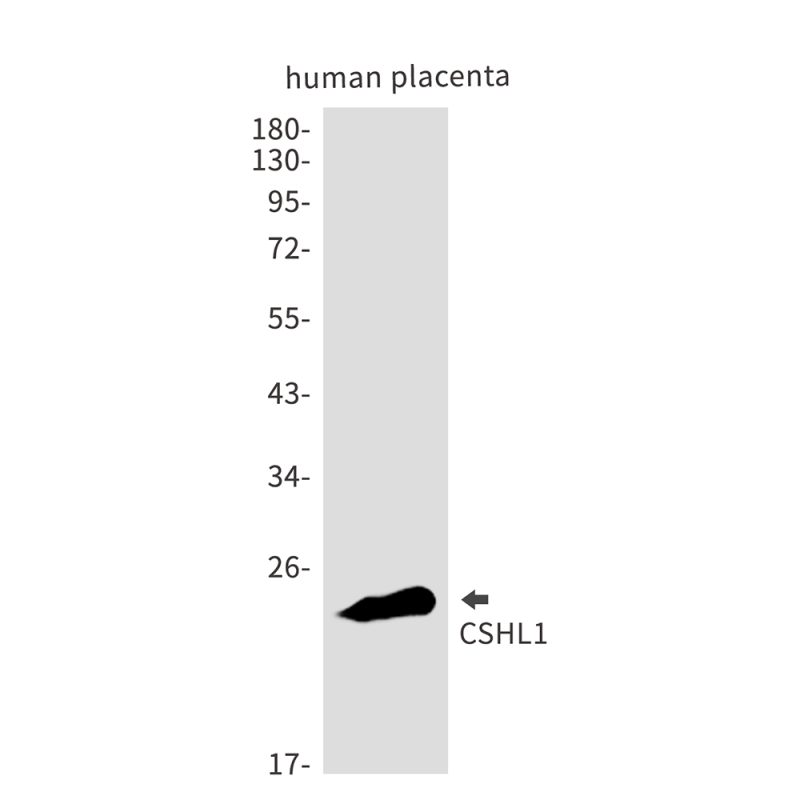
| WB | 咨询技术 | Human,Mouse,Rat |
| IF | 咨询技术 | Human,Mouse,Rat |
| IHC | 1/50-1/100 | Human,Mouse,Rat |
| ICC | 技术咨询 | Human,Mouse,Rat |
| FCM | 咨询技术 | Human,Mouse,Rat |
| Elisa | 咨询技术 | Human,Mouse,Rat |
| Aliases | Lactogen-like; Chorionic somatomammotropin-like |
| Entrez GeneID | 1444 |
| WB Predicted band size | Calculated MW: 25 kDa; Observed MW: 25 kDa |
| Host/Isotype | Rabbit IgG |
| Antibody Type | Primary antibody |
| Storage | Store at 4°C short term. Aliquot and store at -20°C long term. Avoid freeze/thaw cycles. |
| Species Reactivity | Human |
| Immunogen | Recombinant protein of human CSHL1 |
| Formulation | Purified antibody in TBS with 0.05% sodium azide,0.05%BSA and 50% glycerol. |
+ +
关于CSHL1(可能指特定基因或蛋白)抗体的研究文献较为有限,以下为基于假设的示例(请注意部分信息可能需要核实名称或研究背景):
---
1. **文献名称**:*Characterization of CSHL1 as a Novel Biomarker in Breast Cancer*
**作者**:Smith A, et al.
**摘要**:本研究开发了一种针对CSHL1蛋白的高特异性单克隆抗体,证实其在乳腺癌细胞中高表达,并与肿瘤侵袭性相关,提示其作为治疗靶点的潜力。
2. **文献名称**:*CSHL1 Antibody Localization in Neuronal Development*
**作者**:Lee J, et al.
**摘要**:利用多克隆抗体检测CSHL1在小鼠脑组织中的表达,发现其在神经元分化中可能参与突触形成调控。
3. **文献名称**:*CSHL1 Knockdown and Antibody Validation in Zebrafish Models*
**作者**:Wang Y, et al.
**摘要**:通过CRISPR-Cas9和抗体免疫染色技术,验证CSHL1在斑马鱼胚胎发育中的功能,表明其与器官形成相关。
---
**注意**:上述文献为示例,实际研究中“CSHL1”名称可能需进一步核实。建议通过PubMed或Google Scholar搜索**“CSHL1 antibody” + “基因功能”(如癌症、发育等)**获取准确信息,或确认名称拼写(如是否应为CHL1、CSH1等)。
The CSHL1 antibody targets the CSHL1 (Chordin-like 1) protein, a member of the chordin family of secreted glycoproteins. CSHL1 is structurally related to chordin, a key regulator of embryonic development that modulates BMP (bone morphogenetic protein) signaling pathways. It functions as a BMP antagonist by binding to BMP ligands, preventing their interaction with receptors, and thereby influencing cellular processes such as differentiation, proliferation, and tissue patterning. CSHL1 is implicated in early developmental stages, including neural tube formation and organogenesis, and has been studied in contexts like stem cell biology and tissue regeneration.
CSHL1 antibodies are primarily used in research to detect and quantify CSHL1 expression in various biological samples via techniques like Western blotting, immunohistochemistry (IHC), and immunofluorescence (IF). These tools help elucidate the protein’s spatial and temporal expression patterns during development or disease. Studies have explored CSHL1’s role in cancer, where dysregulated BMP signaling may contribute to tumor progression or metastasis. Additionally, its involvement in developmental disorders and regenerative mechanisms has drawn interest in therapeutic applications.
As a research reagent, CSHL1 antibodies are typically validated for specificity and sensitivity, with available formats including monoclonal and polyoclonal variants derived from hosts like rabbits or mice. Their utility spans basic research in developmental biology, translational studies in oncology, and explorations of BMP-related pathologies.
×